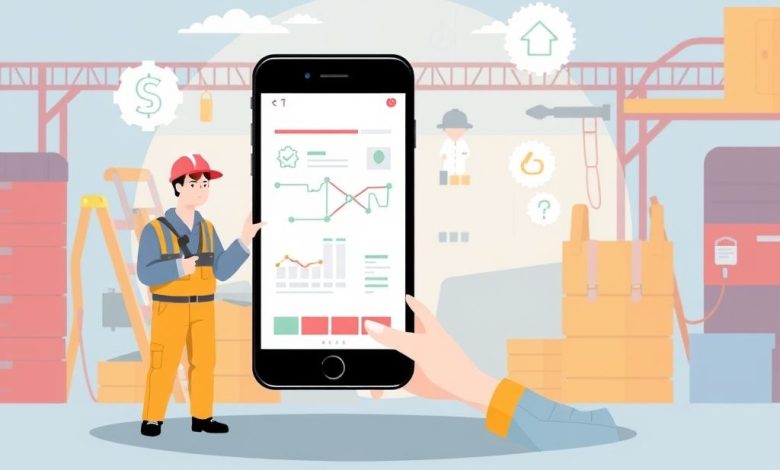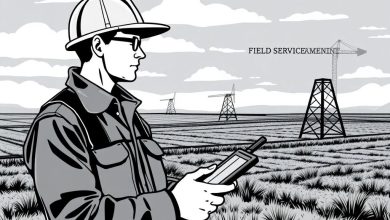Mobile Apps for Field Technicians Enhancing Efficiency and Productivity

Mobile Apps for Field Technicians: Revolutionizing Field Service Management
Introduction
In today’s fast-paced world, technology plays a crucial role in enhancing efficiency and productivity across various industries. The field service management sector is no exception, with mobile apps emerging as game-changers for field technicians. These innovative tools have transformed the way businesses operate, enabling real-time communication, streamlined workflows, and improved customer satisfaction.
This article explores the world of mobile apps designed specifically for field technicians, examining their features, benefits, and impact on field service management. We’ll delve into the current landscape of mobile app solutions, discuss their integration capabilities, and highlight best practices for implementation.
The Rise of Mobile Apps in Field Service Management
Field service management (FSM) refers to the processes involved in scheduling, dispatching, and managing work orders for field-based employees. Historically, FSM operations relied heavily on manual systems, paper-based documentation, and limited technological support. However, the advent of smartphones and cloud computing has ushered in a new era of digital transformation in the field service industry.
Mobile apps for field technicians have become increasingly popular due to their ability to streamline operations, improve efficiency, and enhance the overall customer experience. These apps typically offer a range of functionalities, including:
- Scheduling and dispatching
- Job assignment and tracking
- Inventory management
- Customer communication
- Reporting and analytics
By leveraging these features, businesses can optimize their field service operations, leading to increased productivity and cost savings.
Key Features of Mobile Apps for Field Technicians
Modern mobile apps for field technicians often incorporate several key features that set them apart from traditional FSM systems. Some of the most notable include:
- Real-time job assignments: Technicians receive instant notifications when new jobs are assigned or existing ones are modified.
- GPS tracking: Built-in GPS functionality allows dispatchers to monitor technician locations in real-time, facilitating more accurate ETAs and better resource allocation.
- Digital forms and signatures: Paperwork is reduced to a minimum through electronic forms and signature capture, speeding up the completion process and reducing errors.
- Barcode scanning: This feature enables quick identification of parts, equipment, and other items, streamlining inventory management and job execution.
- Push notifications: Technicians receive alerts for job updates, appointment reminders, and system notifications, ensuring they stay informed throughout their workday.
- Document storage: Cloud-based document storage allows easy access to job details, manuals, and other relevant information directly on the device.
- Integration capabilities: Many modern FSM apps integrate with other business systems, such as CRM software and accounting platforms, providing a holistic view of operations.
- Customizable dashboards: Personalized interfaces allow users to prioritize and organize information based on their specific needs and preferences.
- Offline mode: Some apps offer offline functionality, allowing technicians to continue working even without internet connectivity.
- Multi-language support: This feature caters to diverse workforce demographics and international operations.
Benefits of Implementing Mobile Apps for Field Technicians
The adoption of mobile apps for field technicians offers numerous advantages for both businesses and customers. Some of the primary benefits include:
- Improved operational efficiency: By automating routine tasks and streamlining workflows, mobile apps enable faster response times and more efficient job completion.
- Enhanced customer experience: Real-time updates and transparent communication contribute to higher customer satisfaction levels.
- Increased productivity: Technicians can access all necessary information and complete paperwork quickly, freeing up time for actual work.
- Better resource allocation: GPS tracking and real-time job status updates help dispatchers make informed decisions about resource allocation.
- Reduced administrative costs: Minimized paperwork and automated processes lead to lower overhead expenses.
- Improved data accuracy: Electronic forms and barcode scanning reduce human error associated with manual data entry.
- Scalability: Mobile apps can easily accommodate growing businesses and expanding operations.
- Competitive advantage: Companies that implement advanced FSM technologies gain a competitive edge in their market.
Case Studies and Success Stories
Several companies have successfully implemented mobile apps for their field technicians, resulting in significant improvements in their operations. Here are a few examples:
- Xcel Energy: The utility company deployed a custom-built mobile app that improved first-time fix rates by 25% and reduced truck rolls by 15%.
- Home Depot: Their mobile app for technicians resulted in a 30% increase in completed jobs per day and improved customer satisfaction scores.
- Siemens: The industrial giant saw a 40% reduction in travel time and a 20% improvement in overall efficiency after implementing their mobile FSM solution.
These success stories demonstrate the tangible impact that mobile apps can have on field service operations when implemented correctly.
Challenges and Considerations
While mobile apps for field technicians offer numerous benefits, there are also challenges that organizations should be aware of:
- Adoption resistance: Some technicians may resist adopting new technology, requiring careful training and change management strategies.
- Connectivity issues: Remote areas with poor network coverage can hinder the effectiveness of mobile apps.
- Data security: Ensuring the confidentiality and integrity of sensitive customer and company data is crucial when using mobile devices.
- App customization: Off-the-shelf solutions may require extensive customization to meet specific business needs.
- Integration complexities: Seamless integration with existing systems can be challenging and may require significant IT resources.
To overcome these challenges, it’s essential to:
- Conduct thorough user testing before full-scale deployment
- Develop robust backup plans for connectivity issues
- Implement strong security measures, including encryption and regular updates
- Work closely with IT departments during the implementation phase
- Provide ongoing training and support to ensure successful adoption
Conclusion
Mobile apps for field technicians represent a significant leap forward in field service management. By leveraging cutting-edge technology, businesses can transform their operations, improving efficiency, productivity, and ultimately, customer satisfaction.
As the field service industry continues to evolve, we can expect to see further innovations in mobile app technology. Future developments may include AI-powered predictive maintenance, augmented reality for complex repairs, and seamless integration with Internet of Things (IoT) devices.
For field service managers looking to stay ahead of the competition, investing in mobile apps for their technicians is not just a trend – it’s a necessity. By embracing these powerful tools, businesses can position themselves for long-term success in an increasingly digitized world.
Remember, the key to successful implementation lies in choosing the right app for your specific needs, providing adequate training, and continuously monitoring and optimizing its use within your organization.




